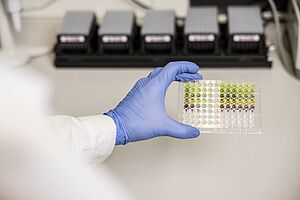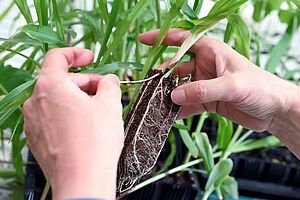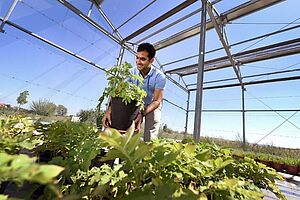In the Bioresources Unit at AIT we investigate the functioning of plant microbiomes and explore avenues for microbiome improvement. We aim to elucidate the ecology of microorganisms in different plant environments, particularly in the plant endosphere, their colonization characteristics, and how they interact with the plant and the environment, considering also microbiome interactions.
Plants host complex microbiomes, which tightly interact with their host and their environment. These plant-associated microorganisms colonize different plant tissues and organs including the rhizosphere and root environment as well as above-ground tissues such as leaves or reproductive organs like fruits and seeds. It is widely recognized that plant microbiomes are extremely important for various plant traits including plant quality parameters. For instance, they also contribute to provide nutrients by fixing atmospheric nitrogen, solubilizing phosphorus or mobilizing micronutrients.
IMPROVEMENT OF STRESS RESILIENCE
Plant microbiomes may also protect plants against abiotic stress, e.g. drought and contribute to improving stress resilience. By assessing the capacity of individual microbial strains or strain combinations to mediate beneficial effects we aim to develop microbiome-based solutions for alleviating plant stress. Some of our strains already have been placed on the market by our partner companies.
THE SEED MICROBIOME
We are particularly interested in exploring the role of the seed microbiome for plant growth and development. Our research showed that seeds carry important endophytes which play a key role for germination and early development. We could also demonstrate that the seeds can be applied as vectors for carrying microorganisms of interest as well as for modulating soil and plant microbiomes. Accordingly, we developed approaches leading to seeds carrying the target inoculant strains as seed endophytes (SeedJection , EndoSeed) facing less competition and showing efficient colonization.
USING MULTI-OMICS APPROACHES
Furthermore, we aim to understand functions at the microbiome level using multi-omics approaches, assessing for instance the effects of different management practices on stress resilience via soil and plant microbiomes. Another theme is how plant microbiomes interact with nutritional qualities or (secondary) metabolite content. Based on this understanding we elaborate new solutions such as microbiome-based prediction tools or improved application technologies of individual strains or consortia.
FROM LAB TO FIELD
Our approach is to move from basic understanding to application, from lab to field and accompany applications with the analysis of mode of actions, colonization, safety and efficacy. On the one hand, we explore different avenues to fight phytopathogens, and on the other hand, we develop new application technologies (Endoseed, Seedjection) and formulations such as foliar sprays, soil amendments and granules.
SERVICES
As research services we offer microbiome and metagenomic analysis including bioinformatics, detailed analysis of genomes, transcriptomes and functions of individual bacterial and fungal strains, monitoring and assessment of plant colonization by sophisticated microscopy or by molecular analysis of strain-specific markers. Together with our partners we jointly develop specific applications to improve plant quality traits.
Further information
Microbial applications in agriculture
Biocontrol of Plant diseases
Formulations and Coatings
Microbial Remediation
Selected Projects
| Cluster of Excellence | „Microbiomes Drive Planetary Health“ | FWF |
| MicroSuppress | The role of plant microbiomes of Triticum aestivum in stress suppressiveness | FWF |
| MICROBIOMES4SOY | Healthier diets and sustainable food and feed systems through employing microbiomes for soya production and further use | Horizon Europe |
| Microbes-4-Climate | Microbial services addressing climate change risks for biodiversity and for agricultural and forestry ecosystems: enabling curiosity-driven research and advancing frontier knowledge | Horizon Europe |
| MICROBE | MICRObiome Biobanking (RI) Enabler www.microbeproject.eu/ EU | Horizon Europe |







